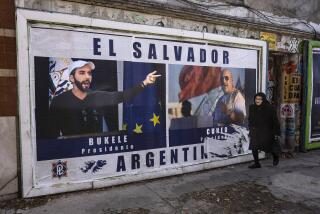Mandela Lauds Castro as Visit to Cuba Ends : Diplomacy: ANC leader cites the Communist revolution and says, ‘We, too, want to control our own destiny.’
- Share via
HAVANA — South African anti-apartheid leader Nelson Mandela ended a three-day visit here Saturday after an unhesitant embrace of Cuban President Fidel Castro’s Communist revolution, which he called “a source of inspiration to all freedom-loving people.”
“We admire the sacrifices of the Cuban people in maintaining their independence and sovereignty in the face of a vicious, imperialist-orchestrated campaign,” Mandela told a rally at which he was Castro’s honored guest. “We, too, want to control our own destiny.
“The most important lesson that you have for us is that no matter what the odds, no matter what difficulties you have had to struggle under, there can be no surrender,” he added. “It is a case of freedom or death.”
Mandela, president of the African National Congress, arrived in Cuba from Jamaica on a Latin American tour. He left to lobby Brazil, Mexico and Venezuela to maintain sanctions against South Africa’s white minority government even though the United States has lifted them. He is also urging support for his call for a national unity government in Pretoria to supervise elections and constitutional reform.
But no persuasion was needed with Castro, who brands apartheid “a creation of Western capitalism and imperialism.” Mandela’s Havana stop was like a love fest between two revolutionaries who had long admired each other but never met.
“Cuba is our second home,” Mandela’s wife, Winnie, said while touring downtown Havana. “We feel we have always belonged here.”
During his visit, Mandela thanked Castro’s government for supplying arms to the ANC in the early 1960s and said the writings of Che Guevara, the guerrilla hero of the Cuban revolution, had inspired him during his 27-year imprisonment. He said the Cuban army’s resistance of invading South African forces in Angola during the 1970s and ‘80s had strengthened the anti-apartheid cause and led indirectly to his freedom.
Castro’s “consistent commitment to eradicate racism,” Mandela said, was especially valued after the Bush Administration, “without consulting us, merely informed us that American sanctions (against Pretoria) were to be lifted.” Easing sanctions is “completely unacceptable,” he said, until the recent repeal of apartheid laws succeeds in dismantling South Africa’s practice of racial separation.
Mandela wore a Cuban guayabera tropical shirt Friday night to a rally in the city of Matanzas marking the anniversary of a 1953 guerrilla assault that led to Castro’s seizure of power six years later.
Hugging on the dais, the two men made an odd couple. The gray-bearded Castro, 64, has become ever more isolated in the world over the last two years. Allied Communist regimes have collapsed across Eastern Europe, and the Soviet Union, his principle benefactor, has cut back its aid, intensifying the impact of a 30-year-old economic embargo by the United States.
Mandela, nine years older than Castro but trimmer and more youthful-looking, has grown in international stature since his release from prison nearly 18 months ago. He is perhaps Castro’s most powerful ally.
Grateful for distinguished company, Castro awarded Mandela the Order of Jose Marti medal, Cuba’s highest honor. During a ceremony Thursday dedicating installations for the Pan American Games, which Cuba will host next month, Castro complimented his guest for maintaining “an athletic figure” during his years in prison.
“If you want an example of a firm, valiant, heroic, serene, intelligent and capable man, this example, this man, is Mandela,” Castro told the televised rally.
Mandela has been criticized by Western governments for his friendship with Castro, Palestine Liberation Organization leader Yasser Arafat and Libyan leader Moammar Kadafi, from whom he accepted the Kadafi International Prize for Human Rights last year. Amnesty International and other rights groups that protested Mandela’s imprisonment have censured Castro’s one-party system for jailing his opponents and stifling dissent.
Speaking to reporters Saturday before leaving for Venezuela, Mandela refused to endorse such criticism.
“If there is a diversity of opinions about Cuba, I understand that,” he said. “The people of South Africa and the ANC are entitled to have our own friends and allies . . . and in this particular case, Cuba is our friend.
“We are now being advised about Cuba by people who have supported the apartheid regime these last 40 years,” he declared. “No honorable man or woman could ever accept advice from people who never cared for us at the most difficult times.”
Mandela warned repeatedly that the ANC might abandon talks with South African President Frederik W. de Klerk and resort to “other options” if he refuses to negotiate on an interim government.
Referring to admissions of secret government funding for the ANC’s main black rival, the Inkatha Freedom Party, Mandela charged that the government is trying to harass and weaken his movement. “These revelations have strengthened our demand for an interim government because what we’ve been saying all along, that the government cannot be a player and a referee at the same time, has now been fully corroborated,” he said.
More to Read
Sign up for Essential California
The most important California stories and recommendations in your inbox every morning.
You may occasionally receive promotional content from the Los Angeles Times.













